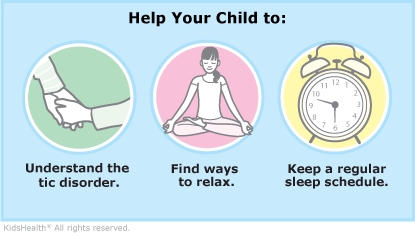Tics are short, sudden, repeated movements or sounds that kids can't completely control. Examples of tics include shrugging, sniffling, blinking, or throat clearing. Tics may be more noticeable when kids are stressed, anxious, or tired. Tics may be less frequent when kids are relaxed.
In most kids who develop a tic, it lasts for a while and then disappears. This is called "transient tic disorder." It's a temporary condition that's common in kids.
If your child has several types of tics, they might be caused by Tourette syndrome. People with Tourette syndrome have different types of tics, some involving movements and others involving vocal sounds. Usually, as kids with Tourette syndrome get older, their tics become milder or may go away.




Can a person control tics? Someone with a tic disorder has little or no control over their tics. Sometimes a person can briefly hold off a tic with a lot of effort. When this happens, they may then have to "let out" tics that they were holding back.
How is Tourette syndrome different from other tic disorders? In Tourette syndrome, a child has both motor tics (such as blinking, grimacing, head jerks) and vocal tics (clearing the throat, humming, barking). Kids may repeat what others say or repeat their own words, or repeat gestures. Many kids and teens with Tourette syndrome also have other problems, like attention deficit hyperactivity disorder (ADHD), obsessive compulsive disorder (OCD), sleep problems, learning differences, or anxiety.
Do all tics need treatment? Most tics stop after a few months without treatment, though some may last more than a year. Health care providers usually don't treat tics unless they interfere with daily activities or social interactions, or cause discomfort or pain. Treatment for tics may include behavioral therapy and medicines. Some kids need treatment for the other problems that go with Tourette syndrome, like ADHD, OCD, or anxiety.